VINORELBINE - INJECTION
PHONETIC PRONUNCIATION: (vye-nor-ELL-bean)
COMMON BRAND NAME(S): Navelbine
GENERIC NAME(S): vinorelbine tartrate
Uses
USES: Vinorelbine is used to treat various types of cancer. It is a chemotherapy drug that works by slowing or stopping cancer cell growth.
How to use VINORELBINE - INJECTION
HOW TO USE: Vinorelbine is given by injection only into a vein by a healthcare professional. It is usually given over 6-10 minutes, once a week, or as directed by your doctor. The dosage is based on your medical condition, response to therapy, and body size. If this medication comes into contact with your skin, wash your skin right away and completely with soap and water. If vinorelbine gets into your eyes, flush them right away and completely with water, and contact the doctor.
Side Effects
Precautions
Interactions
Overdose
Images
Reviews
Faq for VINORELBINE - INJECTION
Vinorelbine injection is used to treat certain types of cancer, including advanced breast cancer and non-small cell lung cancer.
Vinorelbine injection belongs to a class of medications called vinca alkaloids. It works by disrupting the growth of cancer cells, preventing them from multiplying and spreading.
Vinorelbine injection is usually given by a healthcare professional as an infusion into a vein (intravenous infusion). It may be given once a week or every other week, depending on your specific treatment plan.
Common side effects of Vinorelbine injection include nausea, vomiting, constipation, diarrhea, hair loss, fatigue, numbness or tingling in the hands or feet, and injection site reactions. Serious side effects may include bone marrow suppression, infections, and allergic reactions.
Vinorelbine injection should not be used if you are allergic to it or have severe liver or kidney problems. It is important to inform your healthcare provider about any other medications you are taking, including over-the-counter drugs and herbal supplements, as they may interact with Vinorelbine injection.
The duration of Vinorelbine injection treatment varies depending on the type and stage of cancer being treated. Your healthcare provider will determine the appropriate length of treatment based on your individual circumstances.
Vinorelbine injection may harm an unborn baby and is not recommended during pregnancy. It is also not recommended while breastfeeding, as it may pass into breast milk and harm the nursing baby. It is important to discuss the risks and benefits with your healthcare provider beforehand.
If you miss a dose, it is important to contact your healthcare provider as soon as possible. They will advise you on what to do next, as missing a dose can affect the effectiveness of your treatment.
Vinorelbine injection may cause dizziness or drowsiness, so it is advisable to avoid driving or operating heavy machinery until you know how the medication affects you. It is important to follow your healthcare provider's instructions regarding any restrictions or precautions while on Vinorelbine injection.
Warning
WARNING: This medication must be given only by injection into a vein (intravenously-IV) by a trained healthcare professional. Deaths have occurred with medications similar to vinorelbine that were injected into the spine. Vinorelbine can lower your blood cell counts (bone marrow suppression) and lower your ability to fight an infection. Your doctor will follow your blood counts closely. Tell your doctor right away if you develop any signs of an infection such as fever, chills, or persistent sore throat. If this medication accidentally leaks out of your vein into surrounding tissue, the skin and/or muscle may be severely damaged. Tell your doctor right away if you have pain, redness, swelling, or discoloration at the injection site.
Disclaimer
IMPORTANT: HOW TO USE THIS INFORMATION: This is a summary and does NOT have all possible information about this product. This information does not assure that this product is safe, effective, or appropriate for you. This information is not individual medical advice and does not substitute for the advice of your health care professional. Always ask your health care professional for complete information about this product and your specific health needs.
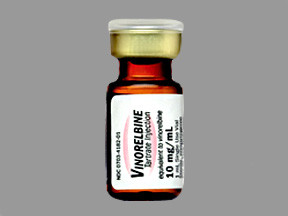
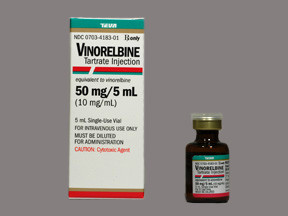
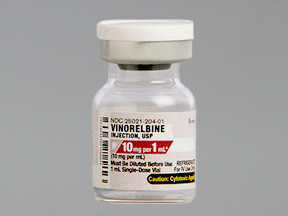
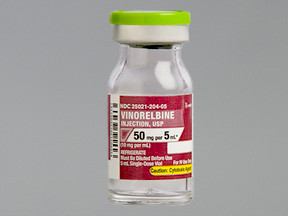

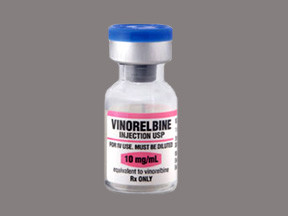
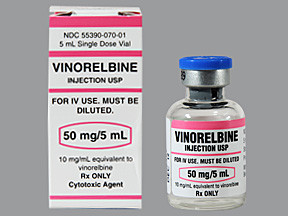
No Reviews Yet